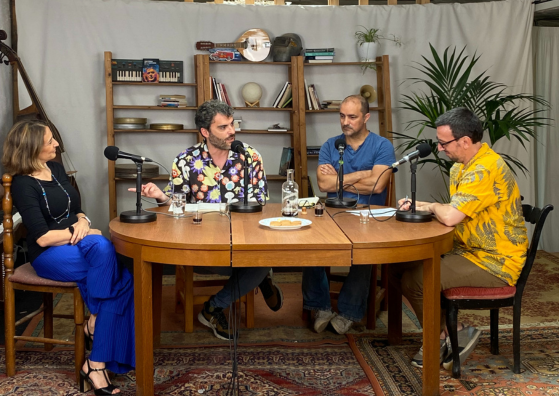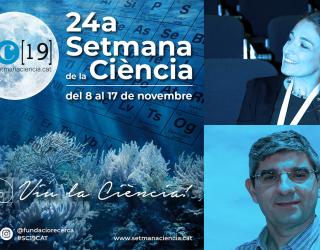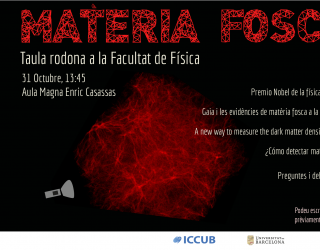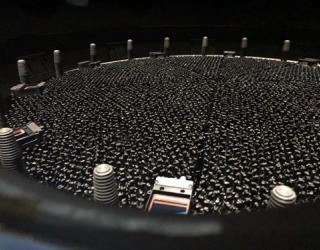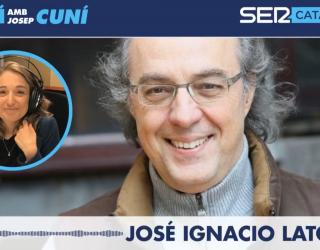Could there be life on Mars? What are gravitational waves? What are the alternative theories to the Big Bang? How can we measure the rate of expansion of the universe? These and many other questions give life to La veu còsmica, an audiovisual podcast in Catalan that combines science, music and poetry. The first episode premieres today.
Throughout 12 chapters of 25 minutes, the researcher Lluís Galbany, from the Institute of Space Sciences (ICE-CSIC) and member of the Institut d'Estudis Espacials de Catalunya (IEEC), accompanied by the poet Esteve Plantada and the musician Joan Garriga, interviews experts on different topics in astrophysics and cosmology, such as space exploration, black holes, dark matter or supernovae.
“The project was born from the desire to bring science closer to the public in an artistic way”, says Lluís Galbany. “This format seeks to attract the public so that they can understand first-hand general scientific concepts, learn more about the scientific research that is currently carried out, and be up-to-date about the latest advances in astrophysics and cosmology,” he adds.
Scientists from different research centers, such as the Spanish National Research Council (CSIC), the Institute of High Energy Physics (IFAE), the Institute of Space Studies of Catalonia (IEEC) and the Institute of Cosmos Sciences of the University of Barcelona (ICCUB), participate in this audiovisual podcast, explaining how research is done in their field and why.
La veu còsmica interviews four researchers of the Institute of Cosmos Sciences of the University of Barcelona such as Gemma Busquet, whose research focuses on the physical and chemical properties of the star formation process; Teresa Antoja, a specialist in Galactic Dynamics and Galaxy Formation; Licia Verde, an astrophysicist with interest in cosmology; and Jaume Garriga, whose research focuses on classical, semiclassical and quantum gravity (including string theory) and theoretical cosmology.
The poet Esteve Plantada and the musician Joan Garriga use the topics discussed in the interviews as inspiration for their artistic creations, which liven up the format while translating technical concepts. First, Esteve Plantada presents the topic to be discussed in the program and its historical context, traveling through time to explain how humanity discovered certain concepts. Later, after the interview conducted by Lluís Galbany, Joan Garriga and other invited artists end the program with a musical composition.
The project is funded by the Catalan Foundation for Research and Innovation (FCRI), thanks to the Joan Oró 2022 Grants for the promotion of scientific culture in Catalonia, as well as the Institute of Space Sciences (ICE-CSIC), the Institute of Space Studies of Catalonia (IEEC), the Institute of High Energy Physics (IFAE) and the Institute of Cosmos Sciences (ICCUB).
More information
Find below the full list of episodes:
- Mars and the possibility of extraterrestrial life, with Guillem Anglada (ICE-CSIC, IEEC)
- Asteroids, with Josep Maria Trigo (ICE-CSIC, IEEC)
- Star formation, with Gemma Busquet (ICCUB, IEEC)
- Black holes, with Mar Mezcua (ICE-CSIC, IEEC)
- Neutron stars and pulsars, with Nanda Rea (ICE-CSIC, IEEC)
- Gravitational waves, with Alicia Sintés (UIB, associate member of the IEEC)
- The Milky Way, with Teresa Antoja (ICCUB, IEEC)
- Large-scale structure of the Universe and dark matter, with Andreu Font (IFAE)
- Inflation and expansion of the Universe, with Diego Blas (IFAE)
- Cosmic Microwave Background and Hubble Tension, with Licia Verde (ICCUB)
- The Big Bang and alternative theories, with Jaume Garriga (ICCUB, IEEC)
- Supernovae, with Lluís Galbany (ICE-CSIC, IEEC)
Podcast available on the following platforms:
Contact
ICCUB Communication & Outreach Office
Anna Argudo and Esther Pallares
Email: secretariacientifica@icc.ub.edu




